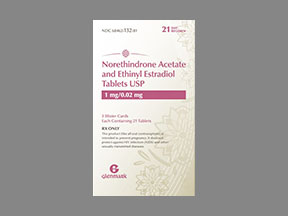Loestrin 1/20 (21) is a limited distribution medication.

Loestrin 1/20 (21) Coupons & Savings Card – Discount Prices from $7.49
Brand for: Norethindrone acet-ethinyl est
My prescription
Edit
1-20MG-MCG, Norethindrone Acet-ethinyl Est (21 Tablets)
Select pharmacy

CVS
$20.56
COUPON PRICE
Walmart
$7.49
COUPON PRICE
Walgreens
$11.16
COUPON PRICE
Albertsons
$11.68
COUPON PRICELoestrin 1/20 (21) savings card
Show this card to your pharmacist
Walmart
$7.49
BIN
ID
PCN
GRP
019876
LHC2018015
CHIPPO
LHX
Powered by
Price history for Loestrin 1/20 (21) (brand) & Norethindrone Acet-ethinyl Est (generic)
21 Tablets, 1-20MG-MCG
Average retail price for Loestrin 1/20 (21)
Average retail price for Norethindrone Acet-ethinyl Est
Average SaveHealth price for Norethindrone Acet-ethinyl Est
Our price history data is based on aggregated prescription data collected from participating pharmacies in America. Our prescription data updates daily to reflect the latest price changes. If you notice a missing data point, it means there wasn't sufficient data available to generate a monetary value for that date.
Over the last 12 months, the average discount price of Loestrin 1/20 (21) is $16.69 using the SaveHealth savings card. That's an average savings of 81.57% on Loestrin 1/20 (21) with our discount card.
*Retail prices are based on pharmacy claims data, and may not be accurate when we don't have enough claims.
Loestrin 1/20 (21) (Norethindrone Acet-ethinyl Est) dosage forms
Dosage Quantity Price from Per unit 1-20MG-MCG 21 Tablets $7.49 $0.36 1-20MG-MCG 63 Tablets $21.47 $0.34
| Dosage | Quantity | Price from | Per unit |
|---|---|---|---|
| 1-20MG-MCG | 21 Tablets | $7.49 | $0.36 |
| 1-20MG-MCG | 63 Tablets | $21.47 | $0.34 |
What are the side effects of loestrin 1 20 21?
Loestrin 1/20 21, a combination oral contraceptive, may cause side effects. Common side effects include nausea, vomiting, headache, bloating, breast tenderness, and changes in weight or appetite. Some individuals may experience mood changes, spotting between periods, or changes in menstrual flow. Serious side effects, though less common, can include blood clots, high blood pressure, liver problems, and an increased risk of certain cancers. It is important for individuals to discuss any concerns or unusual symptoms with their healthcare provider.
Is Loestrin 1/20 discontinued?
Yes, Loestrin 1/20 has been discontinued. However, there are generic versions available that contain the same active ingredients. It is advisable to consult with a healthcare provider for alternative options.
Does loestrin make you gain weight?
Loestrin, like other combination birth control pills, may cause weight changes in some individuals. However, weight gain is not a guaranteed side effect and can vary from person to person. Some may experience weight gain, while others may not notice any change or may even lose weight. It's important to discuss any concerns about side effects with a healthcare provider.
Why has Loestrin 20 been discontinued?
Loestrin 20 was discontinued due to commercial reasons rather than safety or efficacy concerns. Pharmaceutical companies sometimes make decisions to discontinue products based on factors such as market demand, production costs, or the availability of alternative medications. Patients using Loestrin 20 should consult their healthcare provider for suitable alternatives.
Will I gain weight on Loestrin?
Weight gain can be a potential side effect of Loestrin, as with many hormonal contraceptives. However, not everyone will experience this side effect, and individual responses can vary. If there are concerns about weight changes while taking Loestrin, it is advisable to discuss them with a healthcare provider.
